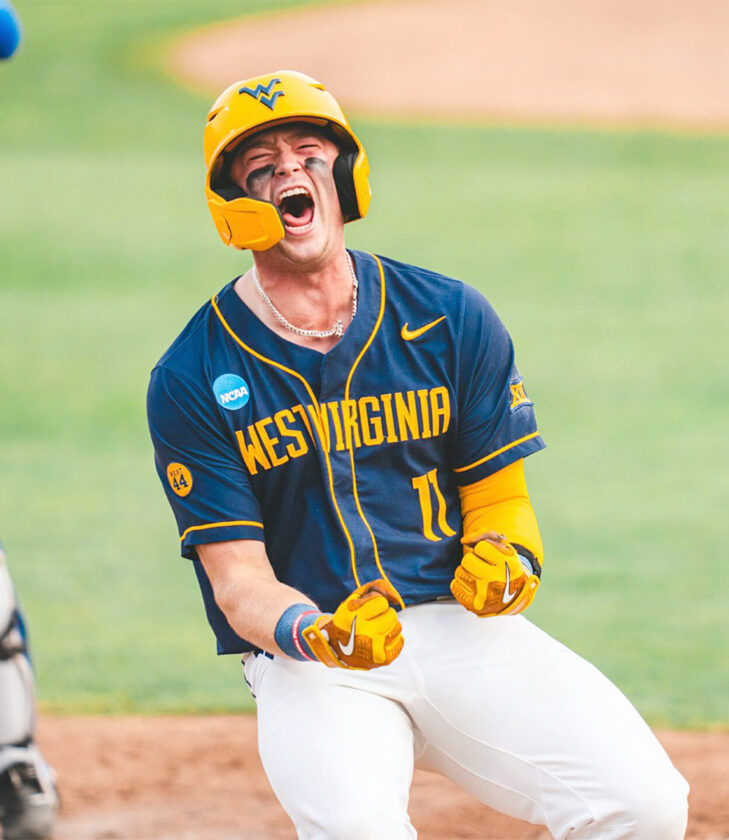There wasn’t much WVU could do to entice former slugger to stay in school

Photo courtesy of WVU Athletics Sam White is shown during his playing days at WVU.
MORGANTOWN — There is good money to be made in professional baseball, that much you already know.
Just look at the World Series, where Toronto slugger Vlad Guerrero Jr. began this season by signing a 14-year, $500 million contract extension. Dodgers’ star Shohei Ohtani will be getting paid millions each year until he is well retired and 49 years old.
Here’s what even I didn’t understand until recently about the makeup of MLB: It generally doesn’t pay to be a college senior looking to begin a pro career.
We’ll try to make this real quick and then we will transition to the decision former WVU slugger Sam White had to make last July.
In the NBA and NFL, if a college junior were to decide to return for his senior season with the hope of improving his draft status and did just that, there are salary structures in place in those leagues to reward such a decision.
Meaning if an athlete is selected 10th overall in the NBA Draft, it matters not if he is a college senior or an 18-year kid, that athlete is going to get paid roughly the same amount of money. The same theory holds true in the NFL, where first-round money is first-round money and second-round money is second-round money regardless of the age of the prospect.
The same is not true in the Major League Baseball draft. Not by a long shot.
This is where we bring in White, who we will quickly remind you was a key piece to the Mountaineers’ run to a super regional over the past two seasons. He played most of last season with a busted shoulder but still led the team with a .361 batting average while driving in 46 runs.
White, who is from Canada, went undrafted in 2025 — mostly because of the shoulder injury, would be the best guess — but signed with Toronto as an undrafted free agent for what we’re hearing was a signing bonus of $150,000.
Now, that’s not bad money. To the average West Virginian, that equals to slightly less than three years’ worth of salary. It’s certainly not life-changing money, which makes you wonder why White didn’t decide to go back to WVU for his senior season to improve his draft status.
That’s exactly what we asked WVU baseball coach Steve Sabins during his Zoom call with the media on Wednesday.
“Losing leverage in the draft is a reality as a senior, because you don’t have the option of going back to school,” Sabins said. “So, pro clubs can own your rights and pay you less and essentially say, ‘Well, you can enter pro ball or you can work at Kroger.’ ”
The best WVU example of this was just two years ago with former standout pitcher Derek Clark. You may remember Clark, who transferred to WVU for his senior season from a Division II school in Michigan. He developed into WVU’s best pitcher in 2024 and nearly pulled off one of the most dramatic pitching performances you’ll ever see in the super regional that season by throwing something, like, 250 pitches in an 8-6 loss against North Carolina.
He was rewarded by getting selected in the ninth round by the Los Angeles Angels. The signing bonus value assigned to his pick was $197,500. As we’re learning, that slot value is simply an arbitrary number.
Clark’s signing bonus was a measly $1,000. It was either take it, or as Sabins said, go work at Kroger.
So, let’s say White had chosen to go back to WVU as a senior and kills it. He hits .400 with 14 home runs, 75 RBIs and wins Big 12 Player of the Year. Maybe he rockets up the draft board. Maybe he gets picked in the third round, where the slot value still ranges from $700,000 to one million dollars.
Even if all of that was true, White would never have been offered that type of money, because he was a senior and teams draft seniors to try and save some signing-bonus money to give to a high-school kid drafted in the fourth round who they want to skip college.
Now, did all of that play into White’s decision to skip his senior season and take a chance at going pro with just $150,000 in his pocket? Maybe, but Sabins said there was more to it than that.
“He came to school to be a professional baseball player,” Sabins said. “He was ready to do that. Going to the Toronto Blue Jays was probably a little bit of an incentive, as well. He grew up his whole life watching the Blue Jays.”
Sabins said he made every attempt to keep White on the roster.
“I told Sam until I was blue in the face that I would have, with my own son, had him go back to school,” Sabins said. “I thought Sam left money on the table, because he was injured and pro teams didn’t really know what position he played.
“I thought he could have come back and caught, played second base and been healthy the whole year. I think he would have hit better. I think if he had come back to school, he would have been a senior who made some money.”
But, White’s decision was already made.
“Even if I could have matched or said, ‘You know what, I’ll get you double (in NIL funds) what the Blue Jays are going to pay you,’ which is not reasonable in our sport, I still don’t think he would have chosen to come back to school. So, that’s where it fell.”




